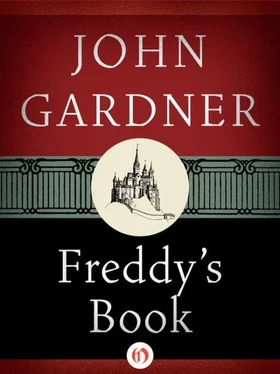“Whatever your mother says,” he said, and raised the bread to his mouth.
“That’s what she said you’d say,” said Andrea whether with scorn or satisfaction he couldn’t make out.
“Tell her we’ll go then,” said Lars-Goren, “if she hasn’t changed her mind.”
Outside someone was again banging metal against metal. The sound was too irregular to be the work of a hammer, and the sound was sometimes loud sometimes lighter, a mere clink. Abruptly, it broke off. He scowled, still trying to guess what it was, but no answer would come to him, and at last he put it from his mind and finished eating. Then, just as he was rising from the table, it began again. He hurried to the door and down the hallway, Andrea coming after him, keeping her distance.
When he emerged into the castle yard he discovered that the day was bright and hot, the sky so blue one could hardly have believed that yesterday there had been heavy leaden clouds. Chickens scattered in front of him, cackling in indignation, startled by the suddenness of his coming through the door. Lady leaped up from her nap in the sunlight and trotted over to him, looking up at him for instructions. A bent old man looked up from the corner of the bailey where he was working, poking mortar into the stones, and he smiled, slightly raising both arms, like a fighting-cock proffering for attack. Again the sound that had been puzzling Lars-Goren stopped. He looked around. Andrea stood a few yards behind him, on the castle steps, the thumbs of both hands in her mouth. He held out his hand to her, inviting her to walk with him. Solemnly, she shook her head. He smiled and shrugged, then turned away, casting in his mind for the direction from which the sound had come. Now the sound began again, and Lars-Goren, with the dog at his heel, went striding toward the castles northwest corner. As soon as he’d rounded the corner he stopped and stood motionless, instinctively raising one hand to Andrea behind him, commanding her to silence.
Two men, helmeted and muffled from head to foot in protective ropecloth, stood slashing at one another with blunted two-hand swords. They struck with such ferocity, such murderous solemnity, without yells or grunts, it seemed that even muffled as they were they must certainly kill one another with their unwieldy, archaic swords. Now Lars-Goren saw what he had missed at first: his son Gunnar crouched just out of range of the flying swords, watching with eyes full of fury and fear. “To the leg!” Gunnar screamed, and the smaller of the swordsmen, seeing the opening at the same instant, came down with so violent a flat-sided blow to the flank of his opponent that the leg went flying out from under the man, turned in grotesquely, as if broken at the knee. “Break!” screamed Gunnar.
“Break! Break!” The smaller of the swordsmen broke and stepped back, dropped the sword, threw off the helmet, and ran to the man who lay rolling on the ground and moaning. Lars-Goren’s dog rushed in, barking officiously. When the victor pulled down his mask, Lars-Goren saw what he’d by now suspected: it was Erik.
Erik reached down to help the man on the ground, who seized the muffled arm and clung to it, wailing “Good hit! Never mind!” then at once went back to moaning and clutching at his leg.
Lars-Goren moved closer, Andrea beside him, taking his hand as if unaware that she was doing it. “Hush, Lady!” he said. The dog barked once more, then controlled herself. When Erik looked up, his face showed nothing, no shame, no pride, no fear — nothing whatsoever. Gunnar moved back a little, as if expecting a blow. The man on the ground was tearing at his mask now, no longer moaning. “It was the boy’s idea, sir,” he said, eyes bulging, full of tears. Lars-Goren recognized his groundskeeper.
Lars-Goren nodded. “Let me help you inside,” he said. He let go of his daughter’s hand and bent down to his groundskeeper, feeling for the break in the bone. So far as he could tell, there was none, but he’d be able to tell for certain when he got him stretched out inside. He put his hands inside the groundskeeper’s armpits, helping him to his feet.
“I told him nobody fights with these old-fashioned swords anymore,” said the groundskeeper. He bit his lips and winced. “But you know these boys!” he said. “Violent! Violent!”
Lars-Goren put his arm around the man’s thick waist and steadied him as he hopped on one leg toward the door, the dog coming carefully beside them, eager to be of use. The groundskeeper’s face was ashen.
Erik hung back, picking up the groundskeeper’s sword, then his own. Gunnar and Andrea came a little behind Lars-Goren, watching him and staying out of reach.
At the steps, Lars-Goren half turned and looked back at his children. Erik, loaded down with the two swords and helmets, met his eyes, as expressionless as before. “Get cleaned up,” said Lars-Goren coldly, as if wearily. “This afternoon we start for Hudiksvall, to see the dragon.” He gazed a moment longer at his son Erik, then turned his attention once more to the wounded groundskeeper.
“They have their own ideas, these young lords,” said the man. His smile was half fearful, half cunning. Tears streamed down his cheeks. “They’re the Devil’s own henchmen — no lie, sir!” Quickly, as if afraid he’d offended, he added, “But he’s brave as the day is long, that Erik! Brave and good-hearted as a saint, sir, that’s no lie!”
7.
AT NOON ON THE FOLLOWING DAY they arrived at Hudiksvall. There was no stable anywhere, as they learned from visitors pushing back from the heart of the city, and at last, full of misgivings, Lars-Goren left his animals with a rabbit-toothed old peasant who’d roped off a field at the outskirts of the city, a field so crowded there seemed no room for the horses to lie down. The city too was crowded, so packed with visitors there was hardly a place to stand, and the crowd was so noisy Lars-Goren and his family had to shout into one another’s ears to be heard. Andrea rode on Lars-Goren’s shoulders, solemn as a viking on watch. Lars-Goren’s wife came just behind, pressing close to Lars-Goren, her hands clamped tightly around the hands of Pia, on her right, and, on her left side, Erik, who held tightly to Gunnar’s right arm. “Do you see it?” yelled Gunnar, as if furiously angry, “do you see it?”
Then at last Andrea cried out, “There it is!” and a moment later Lars-Goren saw it too, a huge, shabby canopy that bore the arms of King Gustav.
“We’re almost there!” he called out and twisted around to make sure that his wife was still behind him.
The closer they came to the statue, the quieter the crowd became, as if somewhere in the vicinity of the dragon and saint some accident had happened, some trampling or stabbing so terrible that a hush of dismay went out around it. But as they pressed still nearer, they discovered that the cause of the silence was not what they’d imagined; it was the statue itself that made the crowd forget its voice.
Lars-Goren for one had seen the statue before, but never with people all around it like this, looking up as if entranced. It was as if, without the people, the statue was incomplete, unreal as a miracle in a grotto where there is no human eye to witness it. Gustav’s soldiers stood every six feet around the statue, but no one gave them reason to raise a finger. For all the pressure of the crowd farther back, it was as still and calm here by the statue as the eye of a tornado. Peasants, burghers, knights in fine dress stood motionless gazing up, some of them weeping, hardly bothering to dab away the tears. Lars-Goren looked at them and felt a ringing in his heart that he could hardly put a name to, whether pain or awe or love or something else — though certainly part of it was love, he knew, love for Sweden and all her bright, wind-bitten faces long or short, fat or thin, light or dark — and love for faces he would never see again, the faces of those who’d died in Sten Sture’s rebellion, on frozen Lake Åsunden, in Execution Square in Stockholm, and later, in Gustav’s revolution. Lars-Goren too was now weeping, hardly noticing, unashamed.
Читать дальше











